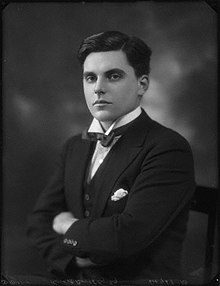Robert Boothby
|
The Right Honourable The Lord Boothby KBE |
|
|---|---|

Boothby in 1924
|
|
|
Member of Parliament for East Aberdeenshire |
|
|
In office 1950–1958 |
|
| Preceded by | constituency created |
| Succeeded by | Patrick Wolrige-Gordon |
|
Member of Parliament for Aberdeen and Kincardine East |
|
|
In office 1924–1950 |
|
| Preceded by | Frederick Martin |
| Succeeded by | constituency abolished |
| Personal details | |
| Born |
12 February 1900 Edinburgh, Scotland |
| Died | 16 July 1986 (aged 86) London, England |
| Political party | Conservative |
| Spouse(s) | Diana Cavendish Wanda Sanna |
| Parents |
Robert Tuite Boothby Mabel Lancaster |
| Alma mater |
Eton College Magdalen College, Oxford |
Robert John Graham Boothby, Baron Boothby, KBE (12 February 1900 – 16 July 1986), often known as Bob Boothby, was a British Conservative politician.
The only son of Sir Robert Tuite Boothby, KBE, of Edinburgh and a cousin of Rosalind Grant, mother of the broadcaster Sir Ludovic Kennedy, Boothby was educated at St Aubyns School, Eton College, and Magdalen College, Oxford. Before going up to Oxford, near the end of the First World War, he trained as an officer and was commissioned into the Brigade of Guards, but was too young to see active service. After Oxford he became a partner in a firm of .
He was an unsuccessful parliamentary candidate for Orkney and Shetland in 1923 and was elected as Member of Parliament (MP) for Aberdeen and Kincardine East in 1924. He held the seat until its abolition in 1950, when he was elected for its successor constituency of East Aberdeenshire. Re-elected a final time in 1955, he gave up the seat in 1958 when he was raised to the peerage, triggering a by-election.
He was Parliamentary Private Secretary to Chancellor of the Exchequer Winston Churchill from 1926 to 1929. He helped launch the Popular Front in December 1936. He held junior ministerial office as Parliamentary Secretary to the Ministry of Food in 1940–41. He was later forced to resign his post and go to the back benches for not declaring an interest when asking a parliamentary question. During the Second World War he joined the Royal Air Force Volunteer Reserve and served as a junior staff officer with Bomber Command, and later as a liaison officer with the Free French Forces, retiring with the rank of Flight Lieutenant. In 1950 he received the Legion of Honour for his latter services.
...
Wikipedia
